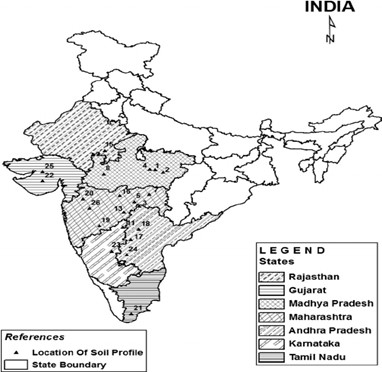-
02 Feb 2024
GS Paper 1
Geography
Day 65: What are black soils? Describe their formation and characteristics. (150 words)
- Start the answer by introducing the Black Soils.
- Describe the formation of Black Soils.
- Explain the characteristics of Black Soils.
- Conclude as per the requirement of keywords.
Introduction
Black soils, also known as regur soils, are a crucial type of soil in the Indian subcontinent. They play a significant role in agriculture and are found in various parts of the country. These soils are agriculturally significant due to their high fertility.
Body
Formation of Black Soils:
- Parent Material:
- Basaltic rocks are the primary parent material for black soils.
- The mineral composition of basalt, including ferromagnesian minerals, influences the soil's fertility.
- Climate:
- The climate, characterized by high temperatures and seasonal rainfall, is conducive to the weathering of rocks.
- Alternating wet and dry periods accelerate the breakdown of minerals, contributing to soil formation.
- Vegetation:
- The type of vegetation in an area can influence the organic content of black soils.
- Decaying plant material contributes to the humus content, enhancing soil fertility.
Characteristics of Black Soils:
- Color:
- The most distinctive feature of black soils is their dark color, ranging from deep black to dark brown.
- This color is attributed to the presence of iron and organic matter.
- Texture:
- Black soils are known for their fine texture, which imparts a smooth, friable structure.
- The fine particles provide good aeration and moisture retention, making them suitable for cultivation.
- This characteristic is particularly beneficial during dry periods, providing a steady supply of moisture to crops.
- Rich in Nutrients:
- Black soils are highly fertile due to the presence of essential nutrients like calcium, magnesium, potassium, and phosphorus.
- pH Levels:
- Black soils are slightly acidic to neutral, with pH levels ranging from 6.5 to 7.5.
- This pH range is conducive to the growth of a wide variety of crops.
Conclusion
Black soils are predominantly found in the Deccan Plateau, covering states like Maharashtra, Madhya Pradesh, Gujarat, and parts of Karnataka and Andhra Pradesh. Their widespread presence in these regions has a significant impact on agriculture, influencing crop patterns and productivity.





